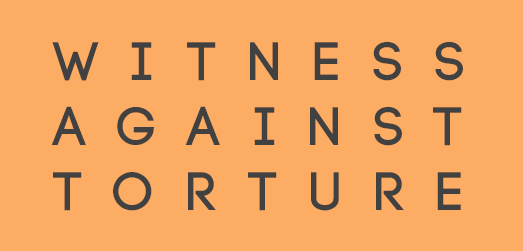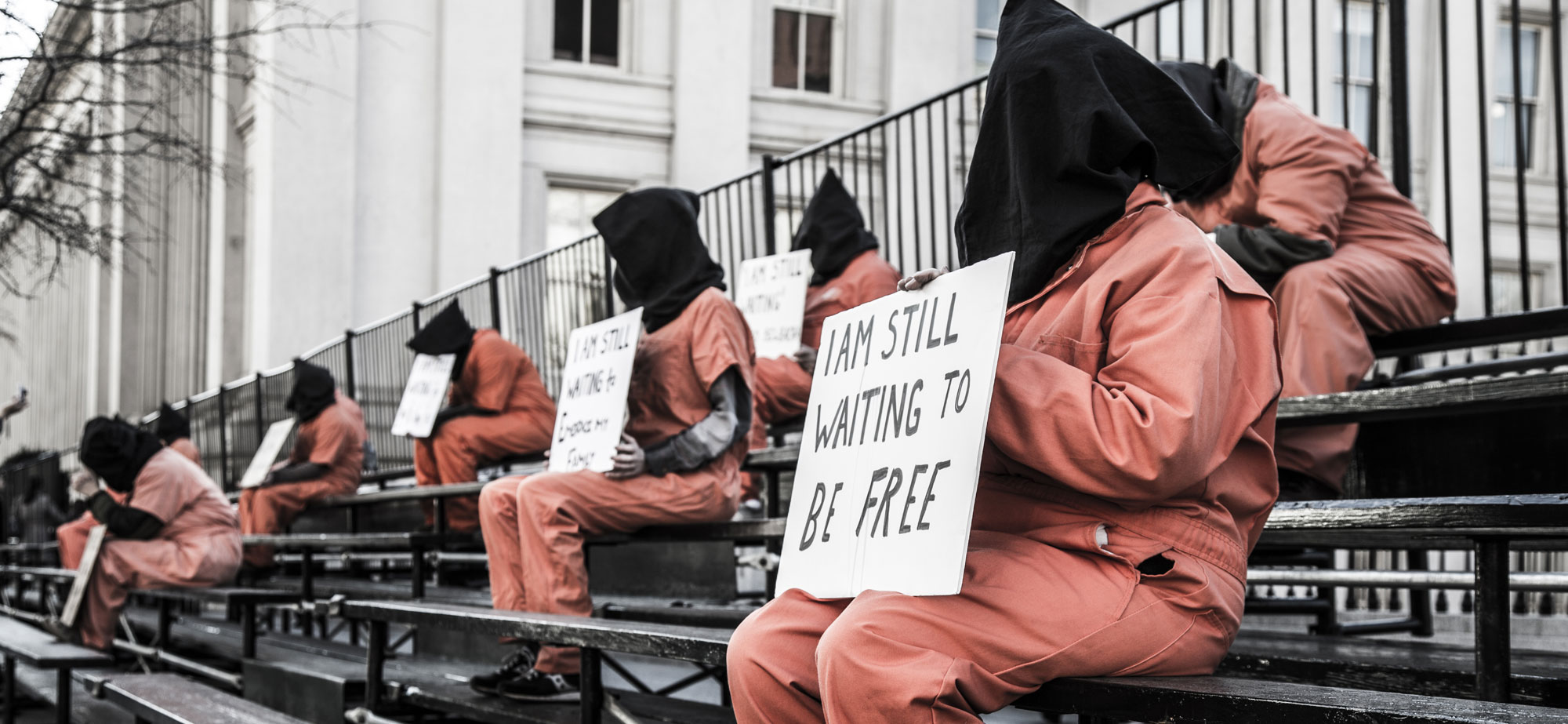From the Archive
Fast for Justice 2014: Day 5
Dear Friends,
This has been a day full of emotion — “day 5 of a fast is often my crying day,” shared one long-time faster in our morning reflection. (He then spoke about the nine men who have died while imprisoned in Guantanamo, moving many in the circle to tears.) Our emotion is not unaccompanied by resolve.
As you know, one way our resolve moves us is to try to carry a message to people on the street here in DC. We have been surprised and often inspired by the responses of those less familiar or altogether without knowledge of Guantanamo. This week, we have witnessed folks freeze in their steps to listen as we begin to softly sing the words, “We’re gonna have a nation that don’t torture no one / But it’s gonna take courage for that change to come.” Many take out phones to film us perform street theatre based on Shaker Aamer’s December 5th letter on being referred to as a package by prison personnel. Many more have approached our leaf-letters, asking, “can you tell me what is this about?”
At the vigil at the white house today, Luke N. asked all present, “What would you do if a Guantanamo prisoner was your brother?” We invite you to hold your answers to this question in your heart as we mark this 12th anniversary of the prison in Guantanamo.
In Gratitude,
Witness Against Torture
Read the January 11th Press Release
In this update
- Statement from Shaker Aamer on 12th anniversary
- Morning Reflection compiled by Palina P.
- January 10th White House Vigil Description by Mary G. and Opening Reflection, by Art L.
- Doctors of the Dark Side Film & Panel Discussion, by Chrissy N.
- Profile of Tariq Ba Odah
- Profile of WAT member, Mike Levinson
- Video from WAT Kennedy Center ‘Cultural Intervention’
- Video Message from Sami al Haj
- Why I keep working to close Guantánamo – by Frida Berrigan
News Links
- This is One of the Biggest Guantanamo Lies
- Yearning for Yemen: The difficulties of returning Yemenis from Guantanamo Bay
Statement from Shaker Aamer on 12th Anniversary
Today is the twelfth anniversary of the establishment of Guantánamo Bay. It has been a blot on the reputation of America, and will remain that until, first, it is closed, and second, lessons are learned from it that can help prevent any repetition in the decades to come.
It will soon be 12 years that I have been in Guantánamo. I arrived on the day my youngest child Faris was born (February 14th, 2014). Even then, I had already spent some two months in US captivity, undergoing terrible mistreatment. Those are twelve years that are lost to me forever.
What I have missed most has been the opportunity to do my part to fill up my four children’s reservoir of love. The early years of a child’s life is a parent’s best chance to show them what love is, before they become more distant with approaching adulthood. Losing this, my opportunity and obligation, is my greatest regret.
However, we must look forward, rather than backwards. Even though British agents supported the Americans in my abuse, I wish them no ill. I do not even want to see them punished. I want only to come home to my family so that I can try to make up to them what I have been unable to provide for all these years.
I am on hunger strike once more. The US military wants to repress the truth about Guantánamo, but the truth will always come out. Others suffer even more than I do. All hunger strikers in Camp VI are now being brought over for a dose of the worst medicine the military can provide here – Camp V Echo, the Alcatraz of Guantánamo Bay. The cells are all steel, and the metal chills the bones as if you are trying to sleep in a refrigeration unit. They now punish us with force feeding, and they punish us with hypothermia, all because we call for justice.
Yet justice will be restored – justice must be restored.
I must say one thing to people out there about January 11: My biggest fear is that someone will do something stupid on the anniversary. When anyone does something wrong on the outside, we on the inside have to pay the price for it. When there was that incident in Yemen, the Americans banned the Yemenis from going home – even though it had nothing to do with the Yemenis here in Guantánamo Bay. I am grateful to those who support us. But if anyone wants to demonstrate on our behalf against the black stain that is Guantánamo, please do it in good faith and good humour, and above all practice no violence.
Morning Reflection
compiled by Palina P.
Our circle grew to over forty people this morning. We began by sharing with the person sitting next to us how we were physically feeling on our fifth day of the fast. After sharing Ann Wright’s “12 Years a Slave vs 12 Years a Prisoner” with the group, we were asked to reflect on what we were doing in 2001 prior to the Iraq War and the subsequent twelve years that have followed. Here are some of the shared reflections:
“I became a parent. So many beautiful things happened in the midst of horror.”
“I’m so grateful I only have to cope with easy things.”
“I was engaged in 2002 and broke it off in 2003 to protest the wars.”
“Atrocities that happened twelve years ago are still happening today. I’ve failed in my commitments to myself. I’d like to drop these shallow commitments.”
“I’m scared. I thought of the despair and isolation the men in Guantanamo are feeling.”
“I think of Guantanamo every day.”
January 10th White House Vigil Description
by Mary G. and Opening Reflection, by Art L.
On a cool, mostly drizzly day, WAT joined the Dorothy Day Catholic Worker and other regulars for their Friday noon Vigil for Justice and Peace out in front of the White House. In coordination with them, our focus was on the injustice and hardship, the pain and fear of the prisoners at Guantánamo Bay Military Base.
Our song lifted us up, giving us loftier thoughts than soggy socks. The witness was well-organized and passionate with some excellent engagement with tourists and other passersby. Luke N. recited an amazing collaborative poem about the prisoners. Some of these passersby looked at us knowingly.
Most of us stood in orange jumpsuits with our signs crying for justice and closure of the prison. We also had a large painted portrait of Shaker Aamer, who has never met his youngest child. Perhaps, the most poignant part of the witness was an exercise where, using a microphone, each person representing a detainee completed the sentence, “If you were my brother….” Our words of pain and passion and love carried across the White House lawn.
===========
We greet all who have come to the White House in a spirit of peace. We gather today at the White House to say YES to love and justice and NO to the lies and death-dealing policies of a national security state and warmaking empire.
The Dorothy Day Catholic Worker began a weekly Friday peace vigil in 1998 here at the White House to call for an end to U.S. criminal warmaking in Iraq and that we embrace God’s command to renounce all war and killing. Since then our vigil has called for an end to all U.S. warmaking and military intervention in our world, for the abolition of all weapons of war–from nuclear weapons to killer drones, for an end to all U.S.-sponsored oppression and torture and justice for the poor and all victims. We remember and pray for all victims of our warmaking empire, including the nine men who have died at Guantanamo over the past seven years.
The U.S. continues to operate with impunity as it has waged lethal wars in Iraq and Afghanistan, uses deadly killer drones as part of its kill-list and assassination program in Pakistan, Yemen, Afghanistan, Yemen and Somalia, and continues its criminal policy of indefinite detention and torture at Guantanamo. This reign of state-sanctioned violence and terror must end! Too many people have suffered and died! All life is sacred. We are all part of the same human family. In biblical terms, if one person suffers we all suffer.
Since April this weekly White House vigil, which has been co-sponsored by Witness Against Torture (WAT) and joined by members of other groups, has had a special focus on the Guantanamo hunger strike. The biblical admonition to proclaim liberty to the captives has taken on a critical urgency regarding the 155 detainees still being held at Guantanamo, many of whom have endured tortuous force-feeding as a result of a hunger strike protesting their unjust confinement. Members of WAT are now in the 5th day of a “Fast for Justice” to call for justice for these detainees and for the immediate closing of Guantanamo.
Adnan Latif, who had spent more than ten years in Guantanamo without ever being charged with a crime, would often go on a hunger strike to protest his unjust confinement. A Yemeni citizen, poet, father and husband, Latif was subject to severe beatings, druggings and torture. He had been cleared for release at least four separate times yet continued to be imprisoned. On September 8, 2012, Latif was found dead in his cell. He is one of the nine men to die at Guantanamo. No independent investigation has been conducted into any of these deaths. In Latif’s own words he asks: “Where is the world to save us from torture? Where is the world to save us from the fire and sadness? Where is the world to save the hunger strikers?”
Adnan Latif, we and many others hear your cry and we will not rest until Guantanamo is closed! Tomorrow marks the 12th anniversary of the first detainees being taken to Guantanamo. And so we appeal yet again to congress and the president: end the dehumanizing policy of indefinite detention and end the crime of torture! And we call on Mr. Obama to issue a presidential directive immediately to stop the tortuous force feeding of the remaining Guantanamo hunger strikers and release all detainees who have been cleared for release. We call, too, for the 46 detainees designated for indefinite detention and who have not been charged, to be either charged and receive a fair trial or be released. Mr. Obama, make good on your promise to close Guantanamo now!
Finally, we demand that all those responsible for directing and carrying out the illegal abduction of these men and the crime of torture and indefinite detention, to repent for what they have done and make reparations to all the victims.
In this New Year let us recommit ourselves to labor together to create the Beloved Community, free of torture, oppression, violence and war. Let us never forget that we are all part of one human family. What affects one, affects all.
Doctors of the Dark Side Film & Panel Discussion
by Chrissy N.
“We need to encourage more people to find their voices, to know the difference between right and wrong.” – Andy Worthington
Tonight we had the opportunity tonight to take a hard, sobering look at some of the gears in the machine that allow Guantánamo, and U.S. torture more generally, to exist. We watched Doctors of the Dark Side, a movie by Martha Davis produced in 2011, about the role of physicians and psychologists in detainee torture. Afterwards we listened to a panel presentation by British investigative journalist Andy Worthington, Guantánamo defense lawyer Todd Pierce, and Stefanie of World Can’t Wait, who unfortunately could not be present in person but asked a colleague read her writing.
The movie examined how psychologists were instrumental in adapting military training exercises for use against prisoners, how doctors’ sense of integrity can get lost in bureaucracy and group think, how death records at Guantánamo and U.S. black sites have been suppressed, and how physical and psychological abuse are combined to completely unravel the victims of torture.
Andy Worthington summarized the twelve months since last January 11th as successful, insofar as the nation was moved by the courage of the hunger strikers in Guantánamo. Last year, the work to close the prison looked like an endless uphill struggle, since Obama had chosen to give in to Congress’ intransigence rather than spend political capital on the issue. Since the hunger strike, eleven detainees have been released, more than twice the number released in the three years prior.
Todd Pierce reflected on how this system of torture makes the people who operate in it depraved. He extended the shadow of complicity from the medical and psychological professions highlighted in the movie, to the legal profession, for allowing the ” ‘torture’ to which our Constitution has been subjected.”
Stefanie reminded us that human societies can do better, don’t have to torture. We must close Guantánamo, it is an “insult to humanity.”
We must close Guantánamo, lest we forget the humanity of our brothers in prison there, lest our hearts become accustomed to torture and, like the doctors and psychologists whose complicity we condemn, we forget our own integrity, humanity, and ability to be connected to one another.
Profile of Tariq Ba Odah
Tariq Ba Odah was born in Yemen, but lived almost of all of his life before his imprisonment in Jeddah, Saudi Arabia. He was sent to Guantánamo in February 2002 at approximately age 24. His petition for a writ of habeas corpus is stayed in the U.S. District Court for the District of Columbia in part because of Mr. Ba Odah’s compromised health.
As of counsel’s last visit to Guantánamo in December 2012, the U.S. Department of Defense has been holding Mr. Ba Odah in solitary-confinement like conditions in Camp 5. It isolates Mr. Ba Odah from the other prisoners because he has been on a 6-year, peaceful hunger-strike to protest his indefinite detention. The Department of Defense views this as non-compliance. Mr. Ba Odah has maintained his hunger-strike throughout the years because he sees the U.S. Department of Defense, the Obama administration, Congress, and increasingly U.S. courts as part of single apparatus of power that keeps him locked-up at Guantánamo and separated from his loved-ones. In his words – hunger-striking “is the only peaceful way I can show the magnitude of the injustice I suffer.”
Mr. Ba Odah is force-fed daily. He is strapped to a restraint chair, a rubber tube is forced down his nose, and a liquid dietary supplement is pumped into his stomach. In what Mr. Ba Odah believes are clear attempts to break his protest, prison administrators have told him that “if [he] stops his strike, [he would] be moved to the common area with friends, television, and recreation time” – basic rights the men in Camp 5 are often deprived.
Mr. Ba Odah is only permitted to be outside of his cell between 2-4 hours per day. Unfortunately, Mr. Ba Odah is often too weak to take advantage of the recreation time that is allotted to him. He has virtually no human contact. He must shout through a slot in the door of his cell to exchange a word with another prisoner. To protest these conditions, Mr. Ba Odah has also gone on “no wash protests,” in one instance going four months without showering, leaving his cell for recreation, or cutting his nails. According to Mr. Ba Odah, he “looked like [he] crawled out of a grave.” No independent medical expert has ever assessed the impact of extended hunger-striking on Mr. Ba Odah’s body. But there can be no doubt that he is need of urgent, sophisticated medical care. Like most other Guantánamo prisoners, Mr. Ba Odah has never been charged with a crime. President Obama should lift the moratorium on transfers to Yemen and certify Mr. Ba Odah for release on humanitarian grounds.
Profile of WAT member, Mike Levinson
Mike lives in Boston, and works at the Scarsdale Library. He has been active with the New York City chapter of the War Resisters League since.
Mike and his brother were uprooted from their hometown in rural eastern Massachusetts and relocated to the New York metropolitan area. The move had a devastating effect on their lives. They had left a small, quiet community and found themselves transplanted into a very hostile environment where the kids in the courtyard of their new apartment complex greeted them with obscene curses. They bullied and burned him with cigarettes while on the school bus. Complaints to guidance counselors were to no avail. These experiences of abuse would have hardened most people, but instead it led Mike to develop a very strong empathetic attitude towards other people in the world who are oppressed, abused, and marginalized. Even further, he has the ability to hang on to this quote from Anne Frank: “It is really a surprise that I have not given up all my ideals, because they seem so absurd and impossible to carry out. Yet I keep them because in spite of everything that has happened to me, I still believe that people are really good at heart.”



Join us on social media